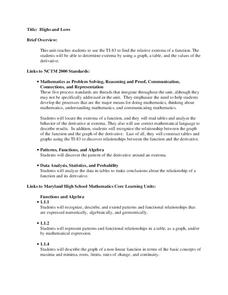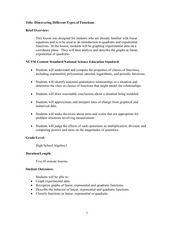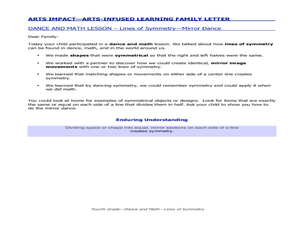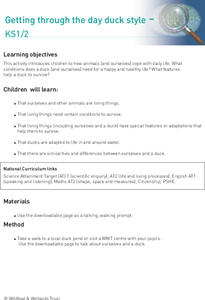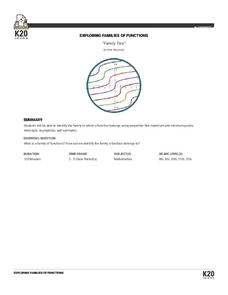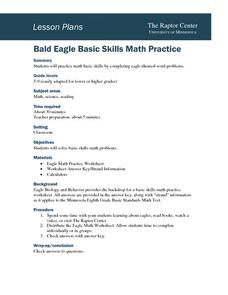Prince William Network
The Incredible Journey
Divide your school gym into breeding grounds and non-breeding grounds so that your zoologists can play a game simulating the seasonal migration of shorebirds. Players pick one of the included game cards and follow its directions, which...
EngageNY
Tides, Sound Waves, and Stock Markets
Help pupils see the world through the eyes of a mathematician. As they examine tide patterns, sound waves, and stock market patterns using trigonometric functions, learners create scatter plots and write best-fit functions.
EngageNY
Interpreting Quadratic Functions from Graphs and Tables
Seeing functions in nature is a beautiful part of mathematics by analyzing the motion of a dolphin over time. Then take a look at the value of a stock and maximize the profit of a new toy. Explore the application of quadratics by...
Baylor College
Why Is Water Important? Pre-assessment
This water worksheet is just the tip of the iceberg! It a multiple-choice quiz meant to be a pre-assessment for a wonderful water unit. There are 10 questions to be answered regarding the role, properties, and behavior of water. Make...
EngageNY
Graphing the Logarithmic Function
Teach collaboration and communication skills in addition to graphing logarithmic functions. Scholars in different groups graph different logarithmic functions by hand using provided coordinate points. These graphs provide the basis for...
Missouri Department of Elementary
Be a Problem Solving Star
Encourage scholars to problem solve everyday frustrations using the STAR method. Using the acronym, learners remember to stop, think, act, and review. Participants begin with a math analogy in which they problem-solve to find the correct...
Curated OER
Highs and Lows
Solve problems using integration and derivatives. By using calculus, learners will analyze graphs to find the extrema and change in behavior. They then will identify the end behavior using the derivatives. Activities and handouts are...
Curated OER
Discovering Different Types of Functions
Graph polynomials and identify the end behavior of each polynomial function. The class differentiates between linear, quadratic, and other polynomial equations.
Curated OER
Lines of Symmetry - Mirror Dance
Fifth graders analyze how to divide space or shape into mirror sections to create lines of symmetry. In this lines of symmetry lesson, 5th graders discuss symmetry in dance, math, and living. Students participate in a dance warm-up and...
Curated OER
Getting Through the Day Duck Style
Students observe ducks at a local wetland. They answer various questions about the ducks behavior and write the answers on a downloadable worksheet.
Curated OER
Multiplying by 10, by 100, and by 1,000
Fourth graders write tenths and hundredths in decimal and fraction notations. In this math instructional activity, learners know the fraction and decimal equivalents for halves and fourths. Everyone answers numerous questions posed by...
Curated OER
What about Babuie's Behavior?
Students read the story about Babuie's behavior and relate it to a finite state machine. For this language arts lesson, students discuss and analyze their reading assignments. They develop a method to help them understand the finite...
Creative Learning Exchange
Lesson Plans From The Lorax
When it comes to the environment, no variable is constant. Class members graph behavior over time for the thneeds produced over truffula trees chopped down over the course of Dr. Seuss's The Lorax.
EngageNY
Graphing Factored Polynomials
Young mathematicians graph polynomials using the factored form. As they apply all positive leading coefficients, pupils demonstrate the relationship between the factors and the zeros of the graph.
K20 LEARN
Family Ties: Exploring Families OF Functions
They say it runs in the family. Small groups use a card sorting activity to group graphs of functions into families. After grouping by families, the class develops conclusions for parent functions and create a graphic organizer.
Curated OER
Bald Eagle Basic Skills Math Practice
Students solve basic skills math problems involving eagles. They read and discuss facts about eagles and view a video. They complete the Eagle Math worksheet and check their answers. They create additional problems and solve them.
Agriculture in the Classroom
Roll of the Genes
Animal reproduction in sheep and cattle is explored with the help of Punnet squares. Scholars employ tools using probability to conclude the color of wool a sheep's offspring will have. Acting as animal geneticists, pupils then take...
Curated OER
Exploring Power Functions 1
Learners describe the end behavior of polynomial functions. Pupils relate the behavior of the graph to the exponent of the graph. They differentiate graphs with odd-exponent and graphs with even exponents.
Curated OER
Derivative Analysis
Young scholars analyze the derivative of a graph. In this calculus lesson, students identify the different behavior of a graph. They label concavity of the graphs as increasing or decreasing.
Curated OER
Studying Birds in the Field
This is a well-designed science activity which helps students learn the behavior of different species of birds. Working with partners and in small team, students learn to scientifically observe birds.
Curated OER
Birds Around the Village
Students observe the physical characteristics of birds and identify birds found in their village. They describe characteristics, behaviors and habitats of local birds in this series of lessons.
Curated OER
Calculating Profits from Selling Virtual Lemonade
Students set up and collect data for a virtual lemonade stand. In this entrepreneurship, economics, and technology lesson, students purchase ingredients, determine costs, and set up a virtual lemonade stand. Students consider weather...
Curated OER
Food Journal Exercise
Students are required not to change their usual eating pattern while recording everything they eat and drink for 1 day. They evaluate the nutrient composition of their diet, as well as their dietary intake and behavior within the...
Curated OER
For The Birds
Student make bird feeders and describe feeding behaviors. In this bird feeder lesson plan, students construct simple bird feeders. They then put them outside and observe the feeding behaviors of birds. Then they graph the number of birds...








